SMRs and waste in France by Virgine Wasselin (ANDRA)
👉 for more info from ASNR on this click here (only in French for the moment)
Prevent and anticipate through transparency and participation
Andrey Ozharovskii was detained by Mongolian authorities while measuring radiation levels with a personal dosimeter near uranium mining sites operated by the French company Orano. Although released, his passport has not been returned, and he faces uncertainty about his freedom of movement.
Ozharovskii’s activities form part of a long-standing European tradition of “citizen science” in the nuclear field: independent experts and local communities taking radiation measurements to help ensure transparency, safety, and accountability. Nuclear Transparency Watch and its members have supported such initiatives across Europe in cooperation with regulators, laboratories, and NGOs.
The principle at stake is simple but crucial: environmental information, including radiation data, must be accessible to the public. This is at the heart of the Aarhus Convention, the international treaty guaranteeing the rights of access to information, public participation in decision-making, and access to justice on environmental matters. Under its Article 3(8), people exercising these rights must not face persecution or harassment.
Mongolia is currently considering accession to the Aarhus Convention. This incident highlights why such commitments matter: ensuring that those who act to protect the public and the environment can do so without fear. At this moment, Andrey Ozharovskii should regain access to his ability to travel freely.
You can read the open letter here.
Small Modular Reactors waste🛢️☢️ were addressed during the FORSAFF seminar 1 from 23-24 April 2025 🗓 at the ASNR‘ facility in Fontenay-aux-Roses 🇫🇷 gathering around 50 participants in person or online.
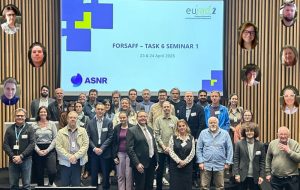 This Work Package dedicated to Small Modular Reactors waste 🛢️☢️ had 2 objectives:
This Work Package dedicated to Small Modular Reactors waste 🛢️☢️ had 2 objectives:
• to identify stakeholder perceptions and concerns related to SMR waste management and develop recommendations for transparent information exchange and dialogue including improving communication with the public.
• to discuss on topic “Policy and Regulatory Framework” with challenges posed to existing policies and regulations by introduction of SMRs and associated spent fuel and radioactive wastes.
A good part of the seminar was dedicated to civil society concerns with some time for working groups exchanging on different challenging cases.
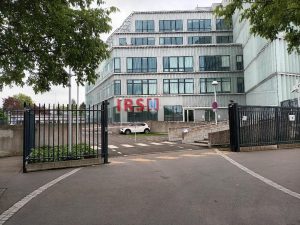
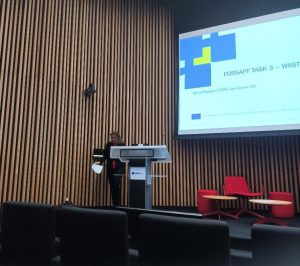
1st CLIMATE WP workshop 🗓 26-27 March 2025
Radioactive waste 🛢️☢️ and climate change impacts 🔥 🌊 were addressed during the 1st Climate workshop from 26-27 March 2025 🗓 at the Mines’ facility in Fontainebleau. A technical visit focusing on climate change impacts in Nemours 🇫🇷 (CEREEP center) launched this event.
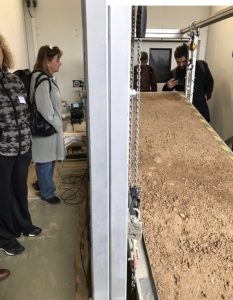
Presentation, analysis, cross-study of keynote papers prepared by different waste management actors, including civil society, helped the 41 participants in elaborating shared viewpoints and outcomes regarding the prior topics to be considered.
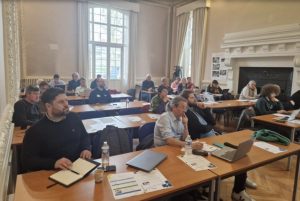
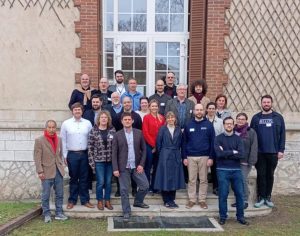
EURAD-2 is a European project 🇪🇺 dedicated to a safe radioactive waste management ☢️🚮 which follows EURAD-1 programme started in 2019 and ended in may 2024. Along waste management organisations, technical support organisations or research entities, Nuclear Transparency Watch 🔎 was included as a “linked third-party” to coordinate the participation of civil society members in some of the work packages. The results of EURAD-1 from the civil society point of view were shared on NTW’s website here: https://www.nuclear-transparency-watch.eu/activities/synthesis-of-the-ntws-results-in-eurad.html
In line, with the outcomes of EURAD-1 where a double wing model was involving civil society members at different levels: a first wing of so-called Civil Society (CS) experts following closely the work packages, producing deliverables and organizing workshops to which a second wing of civil society members were invited to participate. This helped to have complementary views on the process as well as on the results for the civil society members. However, in order to achieve a better dissemination of the results to a larger audience it was proposed to envision a “third-wing” where more civil society members could be reached outside of EURAD’s ecosystem.
Therefore, in October 2024, the month where EURAD-2 started, the European Economic and Social Committee (EESC) and the European Commission (DG Research & Innovation) 🇪🇺 jointly organise a conference called “Radioactive Waste Management: A Civil Society Perspective” on 17 October 2024 from 9:30 to 17:30, in Brussels.
Some members of NTW participated to this event and some were even invited to speak such as Peter Mihok (Slovakia) or Alexis Geisler-Roblin (France) in order to share the results of EURAD-1 from NTW’s perspective or to share the experience for civil society in a country like Slovakia.
The official kick-off meeting of EURAD-2 took place in Ghent 🇧🇪 with 220 participants representing 143 organisations from European and International countries 🌍🇪🇺 participating to 14 technical Work Packages (WP). NTW will coordinate a dozen of “CS” experts involved in the following 5 work packages:
1️⃣ PMO for “Programme Management Office”: coordination and implementation.
2️⃣ ASTRA: dedicated to alternative radioactive waste management strategies
3️⃣ FORSAFF: dedicated to waste management for SMR and future fuels.
4️⃣ CLIMATE: dedicated to the impact of climate change on nuclear waste management.
5️⃣ OPTI: dedicated to High Level Waste (HLW) repository optimisation including closure.
More information on EURAD website: https://www.ejp-eurad.eu/
As an NGO dedicated to ensure and increase transparency and public participation in nuclear safety and security in all fields of nuclear activities[1], Nuclear Transparency Watch (NTW) found it relevant to be involved in the European Joint Programme on Radioactive Waste Management (EURAD).
When EURAD started in 2019, the programme was foreseen to include activities and Interactions with Civil Society (ICS) in the perspective of the Aarhus Convention[2]. Therefore, it was understood that Civil Society (CS) could contribute to enhancing decisions on safety and security of Radioactive Waste Management (RWM)[3].
ICS activities in EURAD were structured based on a so-called “double wing” model[4] that was established and tested during the previous European projects SITEX II[5] and JOPRAD[6] following a specific vision and development plan[7]. This model allowed regular exchanges in between 13 CS experts involved in various EURAD Work Packages (WPs) and 22 CS larger group members attending yearly ICS workshops as described in the figure here below.
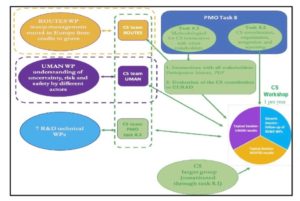 Figure 1 – Structure of ICS activities in EURAD
Figure 1 – Structure of ICS activities in EURAD
The yearly ICS workshops organised by the CS experts for the CS larger group were based on the results obtained by the CS experts from their work for the WPs labelled as “strategic studies” (ROUTES[8] and UMAN[9]) and their work for the WP PMO[10] which included:
Figure 2 – ICS workshop n°6 in Ljubljana (April 2024)
Between 2019 and 2024, 17 deliverables were published by the CS experts on various topics by stimulating interactions with the CS larger group and with the technical partners of EURAD [11]. Moreover, NTW has organized 17 workshops, participated to 30 EURAD events and contributed in around 40 EURAD documents. This iterative process helped to identify and deepen the knowledge in the main areas of concern for CS towards RWM.
First and foremost, the importance of sharing a culture for safety and security was underlined as a cornerstone for any fruitful pluralistic interaction on RWM. Therefore, based on previous studies such as SITEX II[12] a charter for fruitful interactions was established and used as an evaluation tool for the ICS activities in EURAD[13]. It was also considered relevant to update the existing studies on safety culture with more concrete examples of ways and situations where it can be enhanced[14]. Developing the “double wing” model into a “third wing model” was one of the propositions made[15], another was to continue the diversification of ways for CS to participate using existing tools such as the Pathway Evaluation Process (PEP)[16] – allowing pluralistic views on various RWM scenarios which had already proven to be very effective considering the feedback – or with new tools such as a visualisation tool designed by CS to be used as an interactive support enabling knowledge sharing and public participation[17].
Finally, to sustain and improve the Aarhus Convention pillars approved by the European Union[18] and the addition proposed by NTW in the BEPPER report[19], the concept of intergenerational stewardship[20] was studied as a means to maintain a safety culture through time until a final safe enough solution is found. This implies a recognition that the problem remains to be solved going against abandonment and amnesia.
Now that EURAD (2019-2024) is finished, a second phase of the programme (EURAD 2) is under final agreement with EC with NTW again foreseen as the coordinator for all CS organisations – which makes it important to share and evaluate the results of the first EURAD programme. This is why NTW has provided the following feedback for the evaluation of Euratom Research and Training Programme (2021-2025) which encompasses EURAD to assess the strengths and weaknesses of the Programme in the eyes of CS:
As an NGO involved in the Joint Programme on RWM EURAD, NTW has benefited from funding to represent civil society in the programme, in accordance with the first 2 pillars of the Aarhus Convention (access to information, access to participation) to help ensure the development of transparency and safety.
Results were obtained (e.g., production of deliverables on Transparency & Public Participation (T&PP) or Interaction with the Civil Society (ICS)) that envision better ways for interaction of different stakeholders involved in decision making procedures and research. Progress (e.g., double wing model of interaction and involvement in strategic studies) was made in understanding how to approach uncertainties through a shared culture for safety and security and what this could mean in the perspective of intra- and intergenerational stewardship.
However, there is still the need of sufficient structural and material support to develop a sustainable citizen engagement in a trustworthy environment independent from nuclear industry’s influence. Therefore, referring to the obligations under the Aarhus Convention art. 3(2), 3(3) and 3(4), it is necessary to include funds to develop civil society engagement structures to enhance civil society participation from a wider perspective and also in future research and training concerning the development of nuclear technology, including management of radioactive waste.
This is key to develop and implement processes, tools, knowledge, and relations that were previously established in the EURAD programme. If this is not continued, engagement towards transparency, public participation but also safety and security will suffer, as recognized by all stakeholders, who emphasized that participation of civil society in these research programmes is indeed indispensable in increasing safety.
List of publications per work packages in which NTW’s has been involved
PMO
ROUTES
UMAN
MODATS
[1] Nuclear Transparency Watch statutes:
https://www.nuclear-transparency-watch.eu/wp-content/uploads/2024/05/NTW-statutes-2024-ENG.pdf
[2] Adopted on 25 June 1998, the Aarhus Convention is created to empower the role of citizens and civil society organisations in environmental matters and is founded on the principles of participative democracy. See: https://aarhus.osce.org/about/aarhus-convention
[3] EURAD – D1.14 Mid-term evaluation ICS activities and interactions EURAD participants and Civil Society: https://www.ejp-eurad.eu/publications/eurad-d114-mid-term-evaluation-ics-activities-and-experimental-model-interaction
[4] EURAD – D1.13 List of CS group members:
https://www.ejp-eurad.eu/publications/eurad-d113-list-cs-group-members
[5] SITEX-II is the acronym for “Sustainable network for Independent Technical Expertise of Radioactive Waste Disposal – Interactions and Implementation” (2015-2017). Its overall objective was the practical implementation of the sets of activities issued by the previous European research program SITEX (2012-2013). See: http://sitexproject.eu/
[6] JOPRAD is the acronym for « Joint Programming on Radioactive Waste Disposal” (2015-2017). The objective was to prepare a proposal for setting up of a Joint Programming that bring together at the European level, aspects of R&D activities implemented within national research programmes where synergy is identified. See: http://www.joprad.eu/about-joprad/rationaleobjectives.html
[7] The EURAD vision and EURAD deployment plan are two of the founding documents of EURAD.
All the funding documents are available here: https://www.ejp-eurad.eu/publications.
[8] https://www.ejp-eurad.eu/implementation/waste-management-routes-europe-cradle-grave-routes
[9] https://www.ejp-eurad.eu/implementation/wp10-understanding-uncertainty-risk-and-safety-uman
[10] https://www.ejp-eurad.eu/implementation/interaction-civil-society
[11] See the list of deliverables published in the Appendix.
[12] https://igdtp.eu/wp-content/uploads/2019/09/SITEX-II_D4.1-Conditions-and-means-for-developing-SITEX-network_FINAL.pdf
[13] https://docs.google.com/presentation/d/1WJW5URedhv4-Bvj5XeQAZscIYoocOHJ1/edit#slide=id.p1
[14] https://docs.google.com/presentation/d/1IgDUkKpokcO0HIMn6ufBugfthjsXYaJN/edit#slide=id.p1
[15] https://docs.google.com/presentation/d/1TK6e0og1-z-m-xiUOuf0c2_0Qh0gGJ3l/edit#slide=id.p1
[16] https://www.sitex.network/projects/
[17] https://docs.google.com/presentation/d/18kSmg9VybMynwHDRAtL7uKBtW9KrJjxW/edit#slide=id.p1
[18] Access to information, access to public participation and access to justice.
[19] Access to resources. See: https://www.nuclear-transparency-watch.eu/wp-content/uploads/2016/04/NTW_Transparency_in_RWM_BEPPER_report_December_2015.pdf
[20] https://docs.google.com/presentation/d/1hl4Za69yMx60DGuqEJ53qTxew4_OTUmr/edit#slide=id.p14
2023-07-31
Nuclear waste from NPPs remains an unsolved and highly dangerous problem, as spent fuel must remain isolated from the environment for a million years.
In an attempt to solve the nuclear waste problem, an EU-wide directive was introduced in 2011, the “Council Directive 2011/70/Euratom establishing a Community framework for the responsible and safe management of spent fuel and radioactive waste”. This directive tried to force EU member states to address the issue seriously, after this had been neglected for decades – thus immediately proving that nuclear waste has never been effectively dealt with.
The Joint Project has been active for years in monitoring the implementation of the Nuclear Waste Directive, especially with regard to transparency and opportunities for public participation.
The 2023 update of our report is available here.
In 2023, a new process of dialogue has started with the goal to experiment a joint work between civil society and IRSN on the basis of a co-constructed scenario (accident scenario in the operational phase of the repository or scenario of changes in the post-closure phase of the repository) with a view to a shared assessment of the associated safety issues.
Different types of participation were foreseen for the civil society from a general and continuous participation to a punctual and specific participation. In fact, three groups were established to consider three different themes during three different period:
Find out more about it there in French: DT-DAC-Cigeo_Bilan-perspectives_12_07_23
“A step change in European collaboration towards safe RWM, including disposal, through the development of a robust and sustained science, technology and knowledge management programme that supports timely implementation of RWM activities and serves to foster mutual understanding and trust between Joint Programme participants.” here is the description of the objective of EURAD and its activities on their website.
Further it is said that “EURAD Vision, SRA and Roadmap will be delivered through 5-year implementation phases broken down into a set of Work Packages, Tasks and Sub-Tasks.” In fact, this month is the beginning of the last year of this programme in which the Civil Society (CS) had a role to play on different Work Packages (WPs) represented by a diversity of CS experts from NTW:
During this last year NTW will work on an of its task in this programme which is “Dissemination” meaning sharing the inputs and work done with a larger audience than EURAD. A first glimpse of that could be found in the list of webinars below but more will come on the rest of the work done on this topic (deliverables, papers…):
On 05 May 2022 Nuclear Transparency Watch held a webinar on Rolling Stewardship with the following speakers and program:
Purpose
Being engaged in the field of Radioactive Waste Management with a particular focus regarding transparency on nuclear safety and radiation protection, Nuclear Transparency Watch took part as Civil Society participant in the EC EURAD Research Programme in June 2019.
This participation, understood in the perspective of the Aarhus Convention, implied some involvement in several research projects that are, for two of them, designed on a strategical perspective opening to a more comprehensive understanding of socio-technical aspects of Radioactive Waste Management. In this context, it was felt that NTW would take advantage to develop its own thinking on Rolling Stewardship while liaising with interested partners of EURAD. A specific cooperation with the SITEX network (gathering Technical Support Organizations of Regulators of RWM and Civil Society Experts in the field) was also considered.
First speaker: Robert del Tredici
Robert del Tredici has a master’s degree in Comparative Literature at the University of California, and he has been a teacher for much of his life, giving courses in Photography, Drawing, Mythology, and History of Animated Film at the University of Calgary in Alberta and at Vanier College and Concordia University in Montreal. He is and has been a prolific graphic artist and documentary photographer: The People of Three Mile Island (1980), At Work in the Fields of the Bomb (1987), Closing the Circle on the Splitting off the Atom (1993); Linking Legacies (1995); From Cleanup to Stewardship (1997).
Second speaker: Marcos Buser
Geologist with a degree from the Swiss Federal Institute of Technology (ETH) in Zurich, Marcos Buser is a consultant and expert who has been active for more than four decades in the management of industrial and radioactive waste projects, and a former member of several scientific commissions for the Swiss government, including the Swiss Federal Commission for Nuclear Safety. He was a member of the Stocamine steering committee.
On 23 March 2022 Nuclear Transparency Watch held a webinar on Rolling Stewardship with the following speakers and program:
Purpose
Being engaged in the field of Radioactive Waste Management with a particular focus regarding transparency on nuclear safety and radiation protection, Nuclear Transparency Watch took part as Civil Society participant in the EC EURAD Research Programme in June 2019. This participation, understood in the perspective of the Aarhus Convention, implied some involvement in several research projects that are, for two of them, designed on a strategical perspective opening to a more comprehensive understanding of socio-technical aspects of Radioactive Waste Management. In this context, it was felt that NTW would take advantage to develop its own thinking on Rolling Stewardship while liaising with interested partners of EURAD. A specific cooperation with the SITEX network (gathering Technical Support Organizations of Regulators of RWM and Civil Society Experts in the field) is also considered.
First speaker: Niels Henrik Hooge
Master of Laws and Master of Arts in Philosophy. Interested in environmental and sustainability for a long time he has manifested itself in activism, cooperation with green NGOs in Denmark and abroad, as well as in many types of writing. In addition to editorial staff work in Danish environmental magazines, he has published several books, including most recently the novel “Kosova” (2016) and the poetry collections “Grøn nation” (Green Nation, 2015), “Miljødigte” (Environmental Poems, 2018) and “Miljødigte 2” (Environmental Poems 2, 2019).
Second speaker: Gordon Edwards
Ph.D. in Mathematics and Master of Arts in English Literature. Gordon Edwards has been a Professor of Mathematics and Science during all his career during which he did many publications in that field but not only. From 1970 to 1974, he was the editor of Survival magazine. In 1975 he co-founded the Canadian Coalition for Nuclear Responsibility and has been its president since 1978. Edwards has worked widely as a consultant on nuclear issues and has been qualified as a nuclear expert by courts in Canada and elsewhere.
You must be logged in to post a comment.